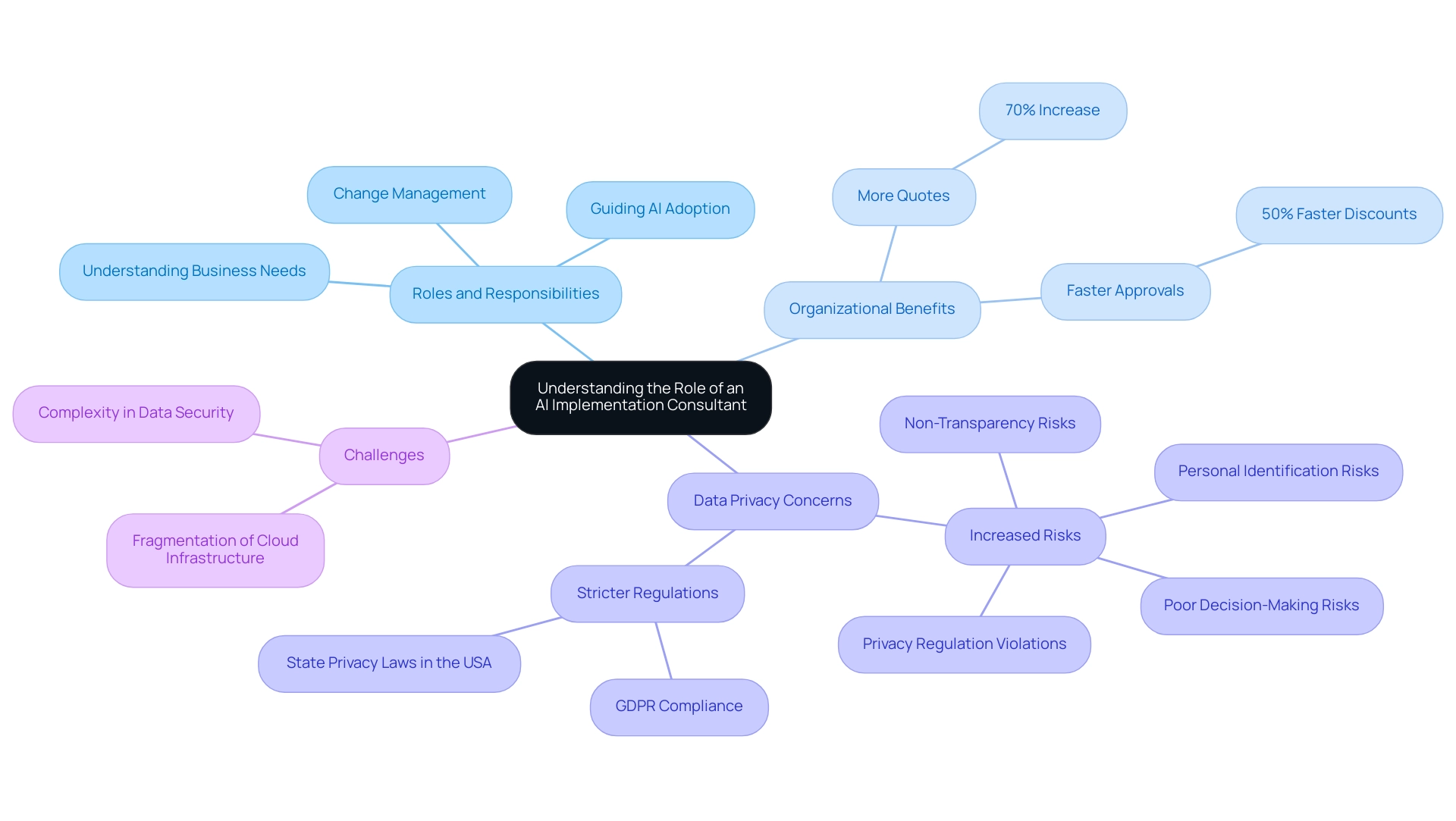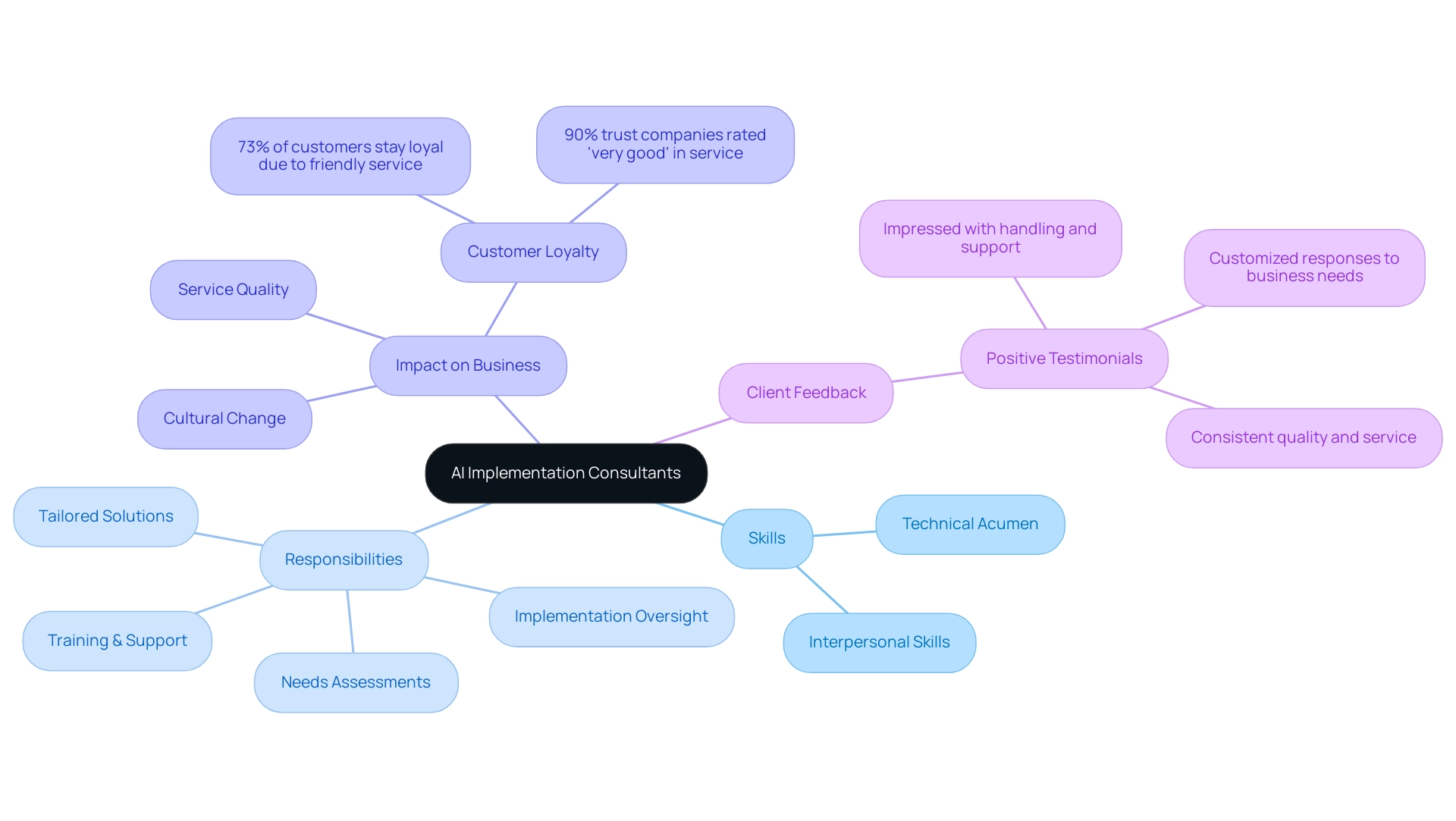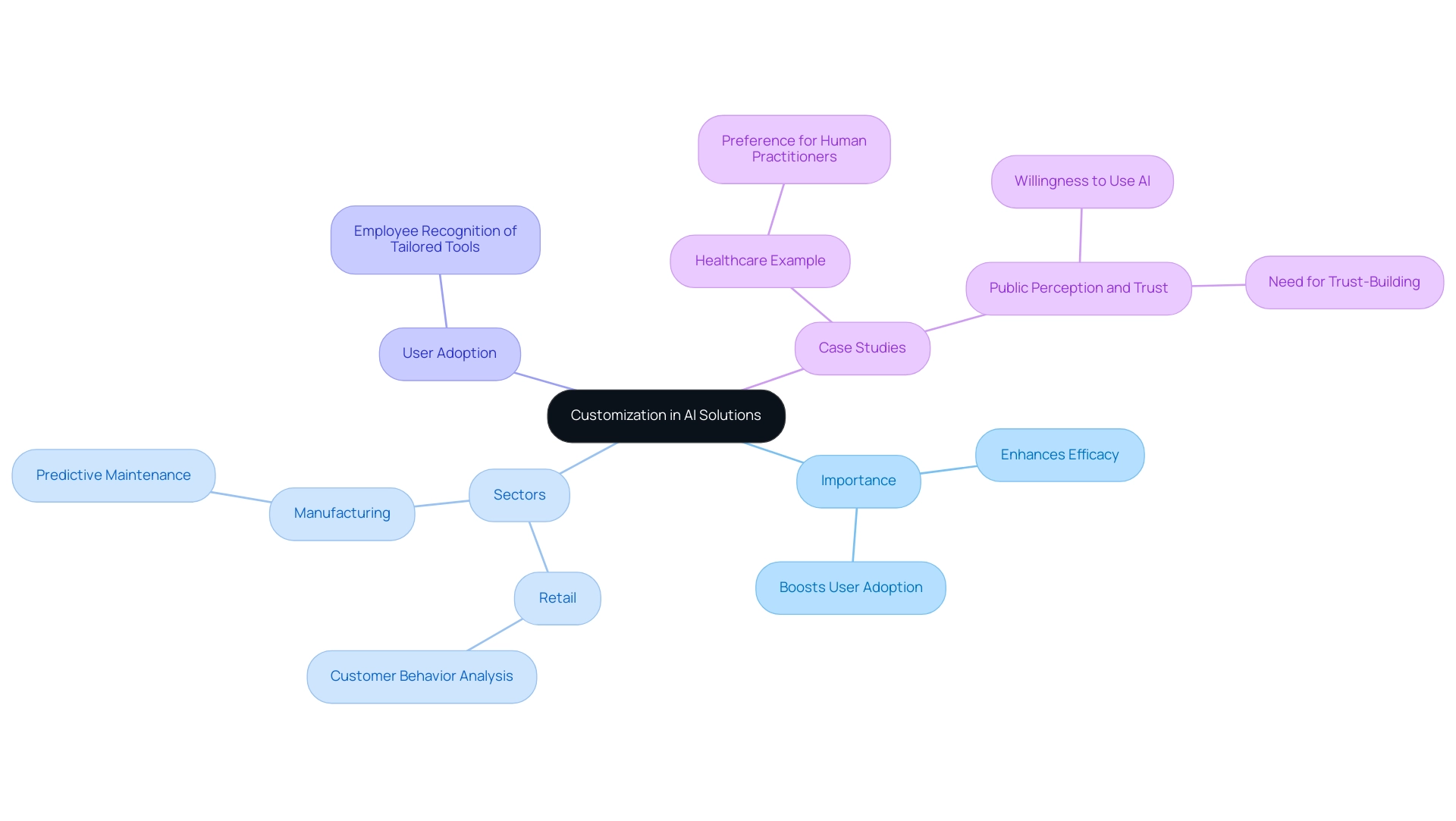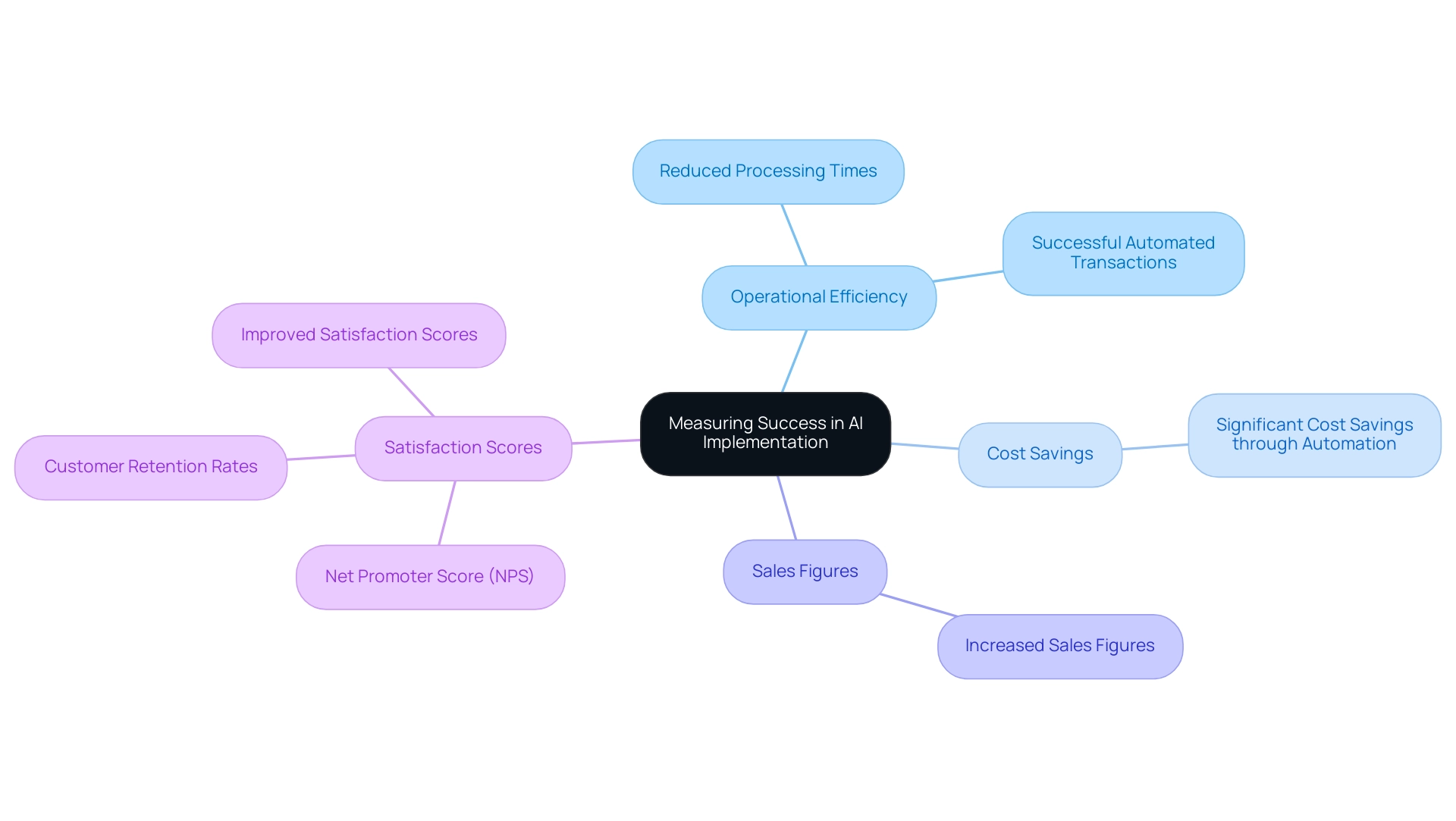Introduction
In the rapidly evolving landscape of artificial intelligence, organizations are increasingly turning to AI Implementation Consultants to navigate the complexities of integrating these transformative technologies into their operations. These specialists play a crucial role in aligning AI solutions with the unique challenges and strategic goals of businesses, ensuring that the adoption of AI is both effective and tailored to specific needs. As companies seek to harness the power of AI to drive efficiency and innovation, understanding the multifaceted responsibilities of these consultants becomes essential.
This article delves into the pivotal role of AI Implementation Consultants, highlighting their skills, the importance of customization in AI solutions, and the metrics necessary to measure the success of AI initiatives, ultimately underscoring their significance in fostering a culture of agility and technological advancement within organizations.
Understanding the Role of an AI Implementation Consultant
An AI Implementation Consultant serves as a vital resource for organizations aiming to integrate artificial intelligence technologies into their operations effectively. This specialized professional is tasked with understanding the unique challenges and strategic objectives of each business, assessing how AI can address these needs, and guiding the adoption of tailored AI solutions that align with organizational goals.
For instance, companies like EXFO have seen a significant impact from AI implementation, generating 70% more quotes and approving discounts 50% faster. By engaging with stakeholders across various departments, the consultant ensures that AI initiatives are not only innovative but also strategically aligned for maximum operational efficiency.
As Petr Nemeth, CEO at Dataddo, highlights, the importance of data privacy will be more significant in 2024, with AI systems bringing various risks to the forefront. Their expertise extends beyond technical implementation; it encompasses change management, enabling entities to navigate the complexities of transitioning to AI-driven processes.
The fragmentation of cloud infrastructure, as discussed by Dan Benjamin, illustrates the challenges organizations face in securing data during AI integration. As AI continues to evolve, the role of these advisors has become increasingly pivotal in fostering a culture of innovation and agility within businesses.

Essential Skills and Responsibilities of AI Implementation Consultants
AI implementation consultants are essential assets for businesses looking to harness the power of artificial intelligence effectively. In 2024, these professionals must possess a unique combination of technical acumen and interpersonal skills. Their responsibilities encompass:
- Conducting thorough needs assessments
- Designing tailored AI solutions
- Overseeing the implementation process
- Providing ongoing training and support to end-users
A deep understanding of AI technologies is paramount, complemented by robust project management skills to navigate complex deployments successfully. As Bain and Company highlights, an individual is four times more likely to switch to a competitor if the problem they're experiencing is service-based, illustrating the critical need for effective support and communication. Furthermore, 73% of customers say they stay loyal to brands because of friendly customer service agents, underscoring the importance of interpersonal skills in AI consulting.
One client noted, 'I was really impressed with the way STS Consulting Group handled everything. From the first conversation to everything in between, they were very helpful and knowledgeable.' This sentiment reflects the necessity for advisors to excel in articulating complex concepts clearly to various stakeholders, ensuring alignment and informed decision-making throughout the project lifecycle.
Another client shared, 'STS Consulting Group was the missing piece to my puzzle. From start to finish, they solved every problem and helped us achieve our goals in the most professional way possible.' This feedback highlights the consultants' capability to offer customized responses that address specific business needs.
Furthermore, almost 90% of consumers have faith in companies rated as 'very good' in service to fulfill their needs, emphasizing the effect of service quality on trust and loyalty. They play a crucial role in enabling cultural changes within institutions, fostering an environment that welcomes AI approaches. Insights from the case study titled 'Taking Care of Your Support Team' reveal that addressing employee needs is essential for better customer service outcomes, aligning with the responsibilities of AI consultants in nurturing a supportive organizational culture.
This holistic approach not only enhances the effectiveness of AI adoption but also significantly contributes to overall organizational success, as echoed in another client’s feedback: 'Using STS Consulting Group helped me save weeks of work. Their delightful level of quality and service is consistent and one of a kind. I can't recommend STS Consulting Group enough.' By integrating these testimonials, we can see a clear pattern of satisfaction and effectiveness that underscores the value of STS Consulting Group's services.

The Importance of Customization in AI Solutions
The importance of customization in AI applications cannot be overstated, as each organization possesses distinct processes, challenges, and objectives. An adept AI Implementation Consultant will meticulously evaluate these variables to develop tailored AI applications that meet specific requirements, moving away from generic approaches. This personalized approach not only enhances the efficacy of the AI tools but also significantly boosts user adoption rates, as employees recognize that the tools are conceived with their workflows in mind.
For instance, in the retail sector, an AI system that analyzes customer behavior patterns specific to a company’s product offerings can yield insights that drive sales and improve customer engagement. Meanwhile, in manufacturing, predictive maintenance capabilities tailored to particular machinery can proactively address issues before they escalate, optimizing operational efficiency.
Significantly, a study discovered that AI surpassed expert doctors in forecasting future PT/INR values, highlighting the effectiveness of tailored AI approaches in critical applications. Abdulkareem M. Albekairy emphasizes that during the preparation of this work, the author(s) utilized tools like Chatsonic/GPT-4, highlighting the significance of customization in AI applications.
Furthermore, case studies, such as the one on public perception and trust in AI healthcare, reveal that while individuals are willing to use AI for health purposes, they still prefer human practitioners for complex issues. This illustrates the necessity of customization not merely as a preference but as a requirement for organizations aiming to maximize the utility of AI technologies in a landscape that increasingly prioritizes specialized solutions.

Measuring Success in AI Implementation
Measuring the success of AI implementation requires the establishment of precise metrics that directly reflect the project's goals. Key performance indicators (KPIs) often include enhancements in operational efficiency, such as:
- Reduced processing times
- Significant cost savings through automation
- Increased sales figures
- Improved satisfaction scores
For instance, common KPIs in AI projects might include:
- The Net Promoter Score (NPS)
- Customer retention rates
- The rate of successful automated transactions
An AI Implementation Consultant plays a pivotal role in collaborating with stakeholders to define these metrics from the outset, ensuring they are firmly aligned with overarching business objectives. In 2024, entities should also focus on integrating real-time analytics and adaptive learning systems to measure the success of AI initiatives effectively. Ongoing evaluations against these KPIs are essential for organizations to assess the effectiveness of their AI solutions and make informed adjustments as necessary.
Expert opinions suggest that aligning KPIs with journey metrics can provide deeper insights into AI effectiveness. For instance, a recent study by Bain and Company highlights that an individual is four times more likely to switch to a competitor if the problem they are experiencing is service-based. Therefore, if an AI system designed for customer service fails to achieve reduced response times or improved customer satisfaction scores, the consultant must conduct a thorough analysis of the implementation process to identify areas needing enhancement. This proactive approach not only fosters trust but also demonstrates a commitment to continuous improvement in AI projects.

Conclusion
AI Implementation Consultants are essential for organizations aiming to successfully integrate artificial intelligence into their operations. Their expertise in understanding unique business challenges, coupled with the ability to design and implement tailored AI solutions, significantly enhances the potential for operational efficiency and innovation. By engaging with stakeholders and facilitating change management, these consultants help organizations navigate the complexities of AI adoption, ensuring alignment with strategic objectives.
The importance of customization in AI solutions is paramount. Each organization has distinct needs, and a one-size-fits-all approach is inadequate. Tailored AI applications not only improve the effectiveness of the technology but also foster greater user adoption as employees see solutions designed specifically for their workflows.
This personalized approach is evident across various sectors, from retail to healthcare, where customized AI can lead to enhanced performance and customer satisfaction.
Measuring the success of AI initiatives is equally critical. Establishing clear metrics aligned with business goals allows organizations to assess the effectiveness of their AI solutions continually. Key performance indicators, such as operational efficiency and customer satisfaction, provide valuable insights that inform ongoing adjustments and improvements.
The role of AI Implementation Consultants in defining and monitoring these metrics cannot be overstated, as they ensure that AI initiatives not only meet immediate objectives but also contribute to long-term organizational success.
In summary, the integration of AI technologies requires a strategic approach that encompasses expert guidance, customization, and continuous evaluation. As businesses increasingly rely on AI to drive growth and efficiency, the role of AI Implementation Consultants will remain vital in fostering a culture of innovation and agility, ultimately positioning organizations for success in a competitive landscape.




